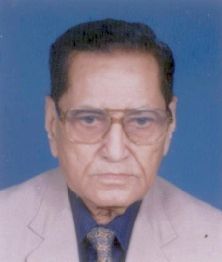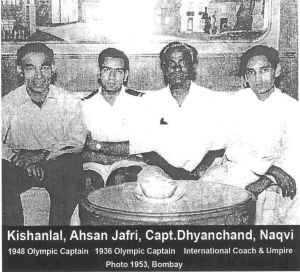 SAIYED Ali Sibtain Naqvi holds a unique distinction of representing both India and Oman in the field of hockey. During the 2002 Olympic Games in Sydney, Australia, a commemorative postage stamp was issued in his name, being a senior administrator among the National Olympic Committees. Naqvi won several national and international honours, including a Lifetime Sports Achievement Award by the Government of Oman. A short film “Evergreen Ace” based on his life was released in 2007. In a candid interview with Inam Abidi Amrohvi, he shared glimpses from his life, and the role hockey played in it.
SAIYED Ali Sibtain Naqvi holds a unique distinction of representing both India and Oman in the field of hockey. During the 2002 Olympic Games in Sydney, Australia, a commemorative postage stamp was issued in his name, being a senior administrator among the National Olympic Committees. Naqvi won several national and international honours, including a Lifetime Sports Achievement Award by the Government of Oman. A short film “Evergreen Ace” based on his life was released in 2007. In a candid interview with Inam Abidi Amrohvi, he shared glimpses from his life, and the role hockey played in it.
“I was born at Amroha on the 10th of Dec, 1929 (the schools’ records showed the year as 1932). Being a survivor of the 1942 Quit India Movement, I remember how students were used for political purposes. I was a student of class Xth in the Govt High School, Sitapur (UP), when India celebrated independence.
The partition of India saw many Muslims migrate to Pakistan in a frenzy. Several close relatives from my family, too, left for Pakistan, leaving behind their properties and assets. India burned as the mistrust between Muslims and Hindus reached a new low. Gandhiji struggled to bring about unity and eventually paid a heavy price for his philosophy.
The situation cooled in the 1950s and I shifted to Lucknow for higher education. That was also the time when the Zamindari System was abolished, many Muslim families struggled for survival as the compensation given was not sufficient.
There was an open tussle between Congress leaders and Britishers. The Britishers and the Anglo-Indian community were in power and held administrative posts. The congress took over the command under Jawahar Lal Nehru and there were great celebrations.
Educational institutions in India ran successfully even then with all the turmoil around.
My growing up years in ShiekMohalla and Mohalla Qaziara, of Sitapur, introduced me to sports. Sitapur was the nursery for hockey talents during that time. Sports for us was the real source of entertainment and physical activity. I picked up the basic skills of hockey at the age of eight. Street hockey tournaments were organised each Sunday. The exploits of Dhyan Chand and Roop Singh from the 1936 Berlin Olympics inspired us all.
My passion for hockey continued throughout my educational life. It was in 1949 when I joined the team of Jubilee Inter College, Lucknow. The institute was reputed to encourage both hockey and football. Incidentally, I was also selected for the football team. During the same time I was invited to join the famous hockey team called M.Y.A. Lucknow. It was the legend Husain Ali Kazmi, a renowned national player, who guided me during my initial years. In Lucknow, I had the good fortune of meeting K.D. Singh Babu (Captain of the 1952 Olympics team). I was lucky to play with him as part of the Lucknow XI at the U.P. Hockey Championship of 1951 in Allahabad. The same year I was selected to represent U.P. XI at the National Championship at Calcutta. The following year Babu introduced me to Kishan Lal (Captain of the 1948 Indian Olympics Hockey team).
I migrated to Bombay (present-day Mumbai) in 1952 to join the BBCI Rly which later became the Western Rly. I played with Kishan Lal in the team. While representing the Western Rly in Delhi I was spotted by Dhyan Chand. The Indian Hockey Federation invited me to seven camps for the selection of the Indian team for the Olympics. I played against visiting teams from Britain, Germany, Malaysia, and Kenya, among others.
I worked as a sports commentator for All India Radio, Bombay, in Urdu and English from 1975 till 1982. In 1982, I migrated to the Sultanate of Oman where I accompanied Oman’s delegation as a Technical Advisor in all Olympics and Asian Games held from 1982 to 2002, i.e. five Olympics and six Asian Games. I also served as Chief Hockey Coach of the Oman National Team. Freelance journalism currently keeps me busy.
It’s sad to see the current state of hockey in India. Indian Hockey Federation is struggling to take control of the situation. The basic hockey skills and spirit of many national players leave a lot to be desired.
The silver lining is that India has natural talent. It’s just that modern hockey needs new infrastructure and changes in our old training system. So far India has lagged in introducing the scientific system. The advanced nations are seeking the help of sports sciences and scientists, and they are successful.
The Olympic gold has eluded us since 1980. I’ve little hope for the future unless drastic steps are taken. Politicians are controlling major sports in India. Sports administration must be in the hands of qualified people with the knowledge and passion for the game.
The youth of India need to show better spirit to build a strong nation. Our country has a rich cultural and sports heritage, which youngsters need to carry forward. This can be realised through discipline and integrity in approach.”
The grand old man of India reminded me twice that he is running on grace time (he’s 83 years old now). I wish him good health and peace. Indian Hockey needs inspirations like him!
UPDATE: SAS Naqvi died on November 10, 2021, in Muscat. He was 89 years old.